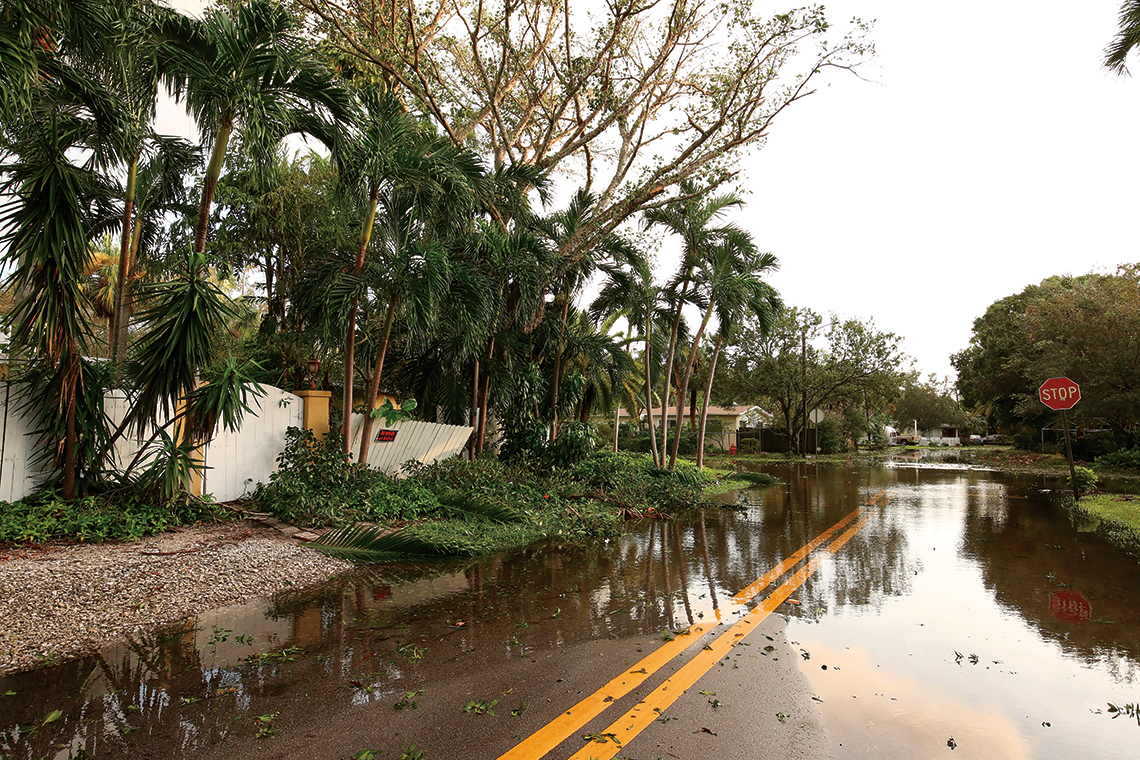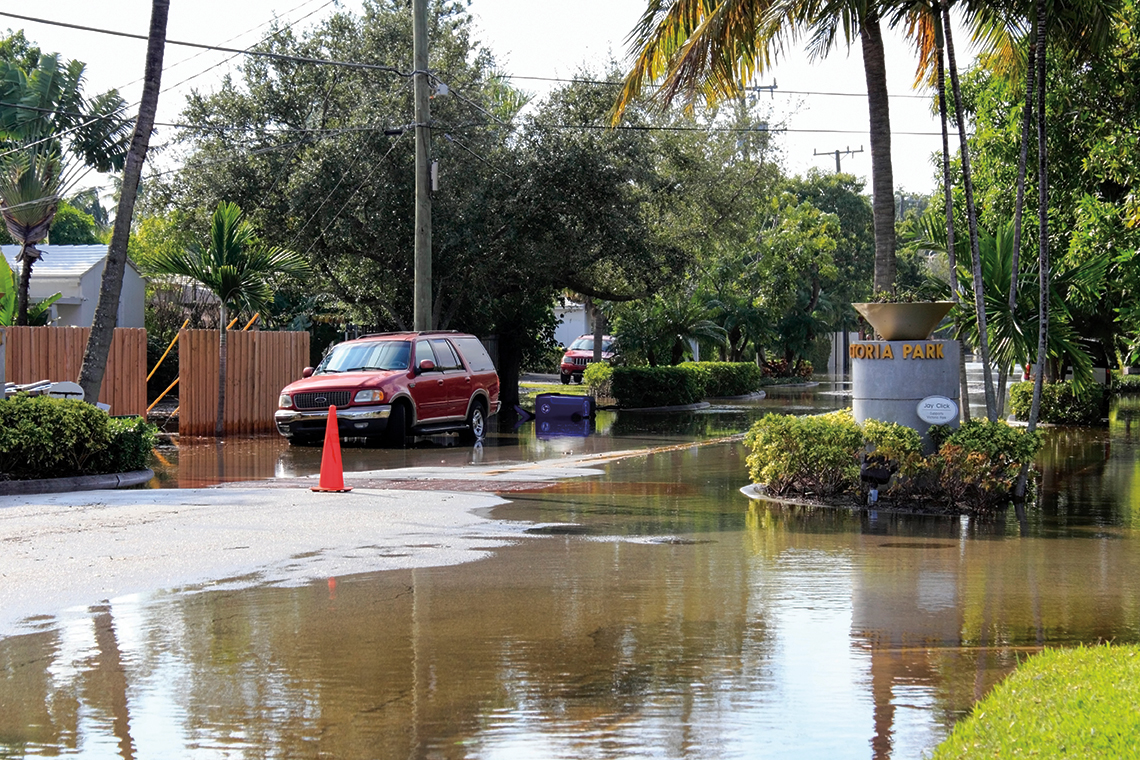In the years ahead, some Broward County homeowners may see their insurance premiums rise faster than their property values. The Florida Office of Insurance Regulation has forecast that the average annual homeowner insurance premiums for a new $300,000 home in Broward will rise from $3,976 last year to $6,345 in 2022 – a 60 percent increase.
“Your rates in Fort Lauderdale are already some of the highest in the nation,” says Barry Gilway, chief executive officer of state-run Citizens Property Insurance Company, the state’s biggest property insurer.
Citizens and the rest of the property insurance industry blame a non-storm surge in litigated claims, particularly for water damages in tri-county South Florida, where insurers are raising premiums in response.
For example, most South Florida homeowners with multiperil coverage from Citizens will see their annual premiums increase by at least 10 percent, effective May 1, and Citizens wanted even more. Gilway says the rising cost of resolving litigated claims for water damage is pushing premiums higher, especially in South Florida, “due to the involvement of litigators and trial bar in the tri-county area.”
Broward, Miami-Dade and Palm Beach counties are routinely cited by property insurers as the state’s leading locations for litigated claims. Insurers also insist these costly claims justify higher insurance premiums for multiperil risks including water damage (as opposed to premiums for coverage of wind damage only). In requests for 2018 premiums that Citizens filed with the state Office of Insurance Regulation, the insurer proposed raising multiperil premiums from the 2017 level by 10.4 percent in Broward, by 10.5 percent in Miami-Dade, and by 9.3 percent in Palm Beach County – compared to a statewide increase of 6.7 percent.

Insurers say homeowners’ practice of assigning the benefits of their property insurance policies to repair companies and attorneys have put more upward pressure on premiums than hurricanes. In a December report on private insurance companies that specialize in Florida property coverage, credit rating agency Fitch said the one-time financial impact of Hurricane Irma was mitigated by reinsurance (or insurance for insurers) while litigated water-damage claims involving assignment of benefits remained a chronic problem.
Florida’s judicial climate for assignment-of-benefits agreements is so favorable to consumers that business interests push back. In December, the pro-business American Tort Reform Association put Florida at the top of its annual list of the worst “Judicial Hellholes” among the 50 states and cited a judicial climate in the Sunshine State that has produced “a gathering storm of abuse” of AOB agreements.
But what insurers call “abuse” is what many homeowners call fair play. What starts as claim adjustment can descend to lowballing by insurers and lawsuits against them. But is the surge in AOB litigation a sure sign of rampant insurance fraud, especially in South Florida? State Sen. Gary Farmer, D-Fort Lauderdale, says that premise is wrong. “The truth is, most of the claims are valid. Most of the people aren’t committing any kind of fraud,” he says. “Nobody is taking a sledgehammer to their pipe so they can have ankle-deep water, because they want a new tile floor.”
People on different sides of the issue propose various solutions, but not many sound confident that Tallahassee will make anything happen. Meanwhile, one thing looks certain: If the current situation remains unchanged, it’s going to get worse. Lynne McChristian, executive director of the Center for Risk Management Education and Research at Florida State University, summarizes it bluntly. “This assignment-of-benefits issue,” she says, “is a non-weather catastrophe.”
Cap the fees, stem the tide?
McChristian agrees with others that the price of Florida property insurance is rising mainly because of litigated claims involving the assignment of benefits for water damage, especially in South Florida. Why is that? Look at some numbers, she says. “I would ask this: What is your lawyer-to-citizen population? That might be a factor.”
Lawyer-bashing is part of a long-running public debate on the assignment of property-insurance benefits, which will continue in the winter session of the Florida Legislature that started January 9 and is set to end March 9.
But legislators’ previous efforts to curtail what insurers call assignment-of-benefits abuse have failed to produce a fix the insurance industry favors. “This,” McChristian says, “will be the fourth or fifth year that they’ve tried to pass legislation.”
In a typical assignment-of-benefits agreement to repair water damage, the homeowner transfers ownership of his or her insurance claim to a damage-repair contractor who, in turn, retains an attorney to sue the insurance company if it denies the claim.
Lawsuits against insurers in cases involving assignment of benefits – or AOB, in industry shorthand – have skyrocketed in Florida. According to the state Department of Financial Services, the number of AOB lawsuits statewide leapt from 405 in 2006 to 28,200 in 2016.
“Insurance companies increasingly are seeing this as a problem … When it was tens and twenties of these kind of cases, that was one thing. But dealing with hundreds and thousands is another,” says Logan McFaddin, regional manager of the Property Insurance Association of America trade group representing about 250 companies that underwrite property and casualty insurance in Florida.
She says the best way to limit abuse of AOB deals with contractors and attorneys is to limit attorney’s fees. “It’s the attorney’s fees that make it such a big problem,” she says. “Our solution is to cap those fees.”
Some bills proposed by state legislators would do that. But McFaddin confesses low expectations: “In the legislative session, I don’t think we’ll see a lot happen.”
Rather than wait for legislative relief, some private insurers operating in Florida are taking steps to reduce exposure to litigated claims for water damage. Some have rolled out so-called “managed repair” programs. They encourage policyholders with water claims to allow insurer-designated contractors to evaluate the damage before assigning their policy benefits to the contractor of their choice.

For example, Heritage Insurance Holdings, Inc. has a wholly owned water-mitigation and construction-services subsidiary, called Contractors Alliance Network, because “whenever we mitigate a loss internally, we are preventing AOB abuses and claim inflation,” Bruce Lucas, chairman and chief executive officer of publicly held Heritage, said last fall during a conference call with insurance stock analysts.
Lucas said Heritage had also reduced its AOB-related costs by restraining the issuance of new homeowner insurance policies in Miami-Dade, Broward and Palm Beach counties. “We are not actively writing in the tri-county area of Florida, and there are a lot of reasons for that,” he said on the call. “I mean, there’s still a ton of fraud there.”
Echoing others in the insurance industry, Lucas said he was pessimistic about the chances that the Florida Legislature can do anything to hold down the cost of litigated claims involving AOB agreements.
“I don’t see a legislative fix,” he said. “There’s always a way around it, right? There’s loopholes, I’m sure, or new ways of inflating claims that the attorneys and contractors are going to come up with. So, for the time being, we continue … our diversification trend away from the tri-county area.”
AOB issues in South Florida have plagued United Insurance Holdings Corp., too. The chief executive officer of publicly held United Insurance said on the conference call with stock analysts that the company was bracing for a wave of hurricane-related claims involving assignment of benefits.
But “the bigger picture on AOB, from our perspective, is that it continues to be a significant issue in Florida, especially in the southeast, especially in Dade and Broward County,” Universal Insurance CEO John Forney said on the call. “And there is no legislative solution in sight.”
Judicial relief for insurance companies has been scarce, too. Demotech Inc., an Ohio-based company that rates the financial stability of regional and specialty insurers, suspended ratings of Florida property insurers issued before February 2017 “due to recent judicial reversals of industry claims procedures that remain intact in other operating environments.” Demotech cited a Florida Supreme Court’s decision in January 2017 that it is unconstitutional to cap attorney’s fees in a litigated insurance claim, overturning lower court rulings and legislation passed in 2012. “This decision implies to us that the Florida Supreme Court need not recognize the intent of the legislature,” Demotech said in a press release.
Gilway, the CEO of Citizens Property Insurance Company, says litigated claims involving assignment of benefits started to become a problem for property insurers in 2012, when the courts began ruling that contractors with AOB agreements could force insurers to pay their attorney’s fees under certain conditions.
As a result, when a contractor with an assigned claim sues an insurer, “if the insurance company settles that suit for $1 more than the original estimate, then the insurance company must pay not only their own defense costs but also the plaintiff costs,” Gilway says.
“It’s a total scam, and it’s driving [property insurance] rates up the wall,” he says. “The settlement values are going up, and the only people benefiting are the attorneys and the third-party [contractors].”
Gilway says the average cost of a non-litigated claim at Citizens is about $6,500 and the average cost of litigated claims is “between $28,000 and $30,000,” including the cost of paying the attorney’s fees of plaintiffs.
“These claims are being mined by these attorneys … This is not a Citizens issue anymore. This is across the state,” he says. “It’s moving more and more out of (the tri-county area) and across the state.”
Citizens is trying to reduce its exposure to litigated water-damage claims by putting a $10,000 cap on such claims. The cap applies only to homeowners who choose their own contractor to repair the damage. No cap applies if the homeowner participates in the insurance company’s managed-repair program and allows a Citizens-designated contractor to assess and repair the damage. The $10,000 cap goes into effect May 1, along with Citizens’ sharply higher premiums for South Florida coverage.
While capping the dollar amount of water-damage claims will help Citizens, limiting plaintiff attorney’s fees that the insurer pays would be a true cure for costly AOB agreements, Gilway says. “The only thing that’s going to solve the problem is if legislation is passed to eliminate the [third-party] access to … attorney’s fees,” he says. Thirteen law firms in South Florida “are driving about 60 percent of these types of cases across the state … You’ve got 13 law firms, all located in the tri-county area, that are just making millions on this stuff, and the consumer’s paying the bill.”
Contractors and attorneys are working together on litigated claims for water damage because “they’re the easiest to present,” Gilway says. “They’re the most difficult for insurance companies to defend against.” In some cases, homeowners assign the benefits of property insurance policies to contractors who never provide the insurer with an estimated damage-repair bill until they file a lawsuit. “Before you can sue an insurance company,” Gilway says, the insurer should have an opportunity “to establish a starting point for the loss.”
Finding solutions, but protecting homeowners
But Gary Farmer, the state senator from Fort Lauderdale, says insurers sometimes set the “starting point” so low that homeowners struggle to win claims that fully cover the cost of repair and replacement.
Farmer, an attorney, recalls a roof leak that damaged wood floors in his two-story home. When he filed a water-damage claim, Farmer says his property insurance company lowballed his claim. For example, the insurer offered to pay for new wood flooring thinner than the damaged flooring and declined to cover the cost of installation.
“They were lowballing me on stuff for the repairs that I wasn’t catching. My contractor was the one who caught the stuff,” Farmer says. “Without the assignment of benefits, they [insurers] can limit claims, lowball claims and deny claims with impunity.”
Among other consumer benefits, AOB agreements allow homeowners to leave the dirty work to third-party contractors and attorneys – fixing the damage and suing the insurance company, if necessary, to win the biggest claim possible. “The ability to assign benefits to a contractor … and have them deal directly with the insurance company on your behalf is a great benefit to the consumer,” Farmer says.

Farmer has proposed legislation to limit claim inflation via AOB agreements. For starters, he proposed a bill that would require state licensing for companies that operate as water-damage repair specialists. “They aren’t licensed by the state or the county or anybody. Everybody else – roofers, plumbers, electricians, contractors, even mold remediators – all have licensure requirements,” he says. “So, right off the bat, we’ve got an unregulated segment of industry that is kind of taking advantage of the fact that they’re out there, cowboys.”
Another legislative proposal Farmer is pushing would require third-party contractors and attorneys with AOB agreements to notify the insurer within seven days of the assignment of benefits and to provide the insurer with a report on the scope of the repair work, plus prior notice of intent to file a lawsuit. In many cases, AOB contractors fix damage and file suit against the insurer instead of first filing a claim for damage with the insurer. “They wait until everything’s done and then just file a lawsuit and never file a notice of claim,” Farmer says, “and that’s not what we want.”
Some state legislators have proposed to limit the attorney’s fees that insurance companies must pay on behalf of plaintiffs when courts rule against them for undervaluing claims.
Farmer opposes limits on insurers’ obligation to pay plaintiff attorney’s fees. He proposes an end to the current practice among property insurers to include these legal costs in their rate base, an amalgam of expenses they use to set premium rates.
When insurers lose a court case over a contested claim and must pay the plaintiff attorney’s fees, “they are allowed to turn around and use those litigation losses in their rate base to set the premiums,” Farmer says. “If you take those out [of the rate base], rates are going to go down precipitously.”
But while a number of potential solutions exist, Tallahassee has not acted. For South Florida homeowners or potential homeowners, the consequence is simple: sky-high insurance rates that won’t be coming down anytime soon.












